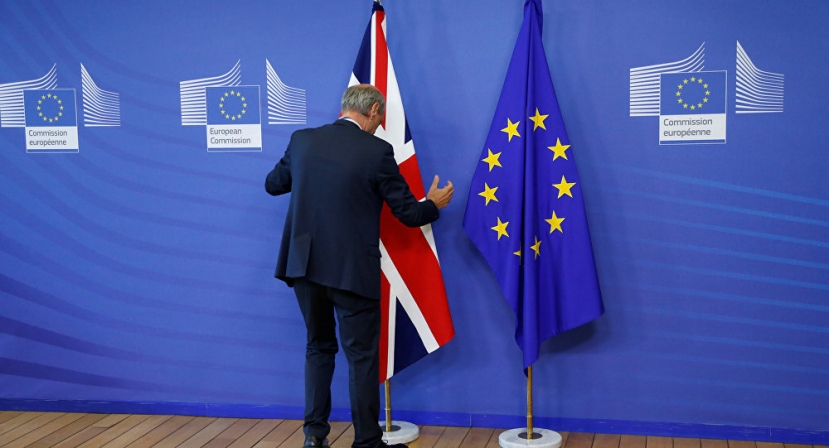'Soft' or 'Hard' Brexit: Five Options for the UK to Say Goodbye to the EU
01.09.2017 08:08
 'Soft' or 'Hard' Brexit: Five Options for the UK to Say Goodbye to the EU
'Soft' or 'Hard' Brexit: Five Options for the UK to Say Goodbye to the EU
The third round of Brexit talks is underway between the UK and the EU, and both sides are criticizing each other of lacking a constructive approach to the process. Sputnik Radio took a look into the future and talked with Dr. Rafael Leal-Arcas about what relations there could be between the two sides after the UK leaves the bloc.
On Monday, the European Union and the United Kingdom began the third round of Brexit negotiations, which officially kicked off on June 19, and are due to be completed by the end of March 2019.
While the UK's exit from the European Union is still far ahead, Sputnik Radio spoke with Dr. Rafael Leal-Arcas, Jean Monnet Chair Professor of European and International Economic Law at the Centre for Commercial Law Studies at Queen Mary University of London, on the possible scenarios for how the UK and the bloc will proceed with their relationship.
There are five possible options from the closest to the furthest away from the EU, he explained.
The closest is the so-called "Norway option": once the UK leaves the EU, it could become a member of the European economic area. This means that the UK would be part of the single market but not part of the European Union. This would be the so-called "soft" Brexit.
The second option is a little bit further away from the EU, the so-called "Swiss option": the UK would become a member of the European Free Trade Area Association (EFTA), just like in case of Switzerland in relation to the European Union.
The third option, again, further away, would be the so-called "Turkey option": the UK becomes a customs union with the European Union, exactly as in the case with Turkey. There is a loud discussion these days on this possibility, Dr Leal-Arcas said.
The fourth option further away would be a deep and comprehensive trade agreement, which is UK Prime Minister Theresa May has been talking about. A good example would be the Canada-EU free trade agreement, the so-called CETA (Comprehensive Economic and Trade Agreement), the expert said.
The furthest away option for the UK would be to remain a member of the WTO (World Trade Organization), which is the case right now. That would mean the case of China's or South Africa's relationship with the EU. It is interesting to note, Dr Leal-Arcas said, that initially this was the preferred option, the so-called "hard" Brexit. But recently there is a new development in negotiations and debate in the UK towards the third option, a customs union. That would be a softer Brexit, he noted.
The expert also commented on the major obstacles in the negotiation process and major concerns for the UK.
In August, the UK government published its position papers on leaving the EU. The documents represent the UK position on trade, the Northern Ireland border and post-Brexit regulations.
"Due to the so-called common commercial policy (which mandates that the European Union negotiates on behalf of its member states), the UK is not allowed to negotiate a trade deal with, for instance, Japan or the US (which are non-EU member states.) So long as the UK is in the EU, this is not allowed due to the common commercial policy, which means that everything is elevated at the super-national level in the EU," , Dr Leal-Arcas told Sputnik.
Brexit would have to happen first and then, once the UK is out of the EU, it would be possible to have bilateral free trade agreements between the UK and third parties, such as India, Australia or the US, he said.
The expert cited as an example, President Trump's willingness to have quick negotiations on a free trade agreement between the US and the UK in the last G20 Summit in Hamburg a few months ago. And emphasize the fact that this is legally not possible so long as the UK is in the EU.
Besides, he reminded, UK Prime Minister Theresa May is currently in Japan discussing a possibility of a free trade agreement between the two states.
Another issue of especial concern to the UK is EU migration into the UK and security, Dr Leal-Arcas said.
"Free movement of people, which is one of the four fundamental freedoms of the single market, is one of the main issues for the UK. And a lot of it has to do with the so-called "language effect." The fact that one of the reasons why people are migrating from other member states of the EU into the UK has to do with the fact that English is lingua franca (a bridge language, common language used among people who do not share a native language). One could argue that there are other member states that could also be interesting destinations, such as Sweden and Finland. However the language barrier might be an issue for EU migration," he explained.
"I think it is important to contextualize the situation: there are around 3.2 million EU citizens currently living in the UK and around 1.2 million UK citizens living in the EU. So, it goes both directions," he said.
Another key issue in the negotiations is financial services, which is of particular importance to the UK. Much of the UK's economy is built on financial services, he went on.
The divorce bill however remains a key issue for the EU, he noted.
"This would be a very difficult point. The Brexit bill could be around 30 billion pounds (32,5 billion euros, $38,7 billion), and this is a very large amount of money. I am pretty confident that it would be a serious part of the Brexit negotiations between the UK and the EU moving forwards," he concluded.
